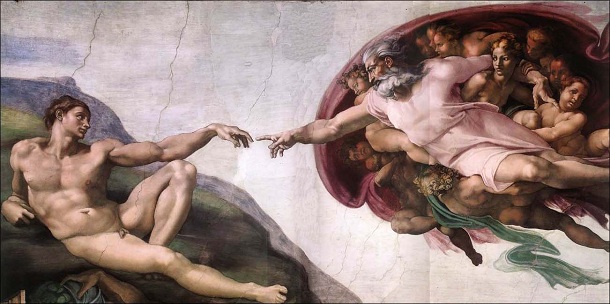Michelangelo’s artistic masterpiece on the ceiling of the Sistine Chapel was opened to the public 500 years ago this week.
The painting of the world-famous fresco – one of the Vatican’s most dramatic offerings – took five years.
It was commissioned by Pope Julius II and Michelangelo was initially reluctant to take the project on.
When he did agree he put his heart and soul into it, depicting more than 300 figures rather than just the 12 apostles originally sought.
The artist’s work covers 12,000 square feet of the chapel ceiling and is believed by many to be his best work.
The ceiling mural was considered a marvel from the moment it went on show on All Saints Day (November 1), 1512.
It now attracts up to 25,000 visitors a day – more than five million people a year.
But the amount of pollution they bring with them is now a major worry for the Vatican.
Museum experts there are now considering crowd control and a filter system to cut down the dust and pollutants which, long term, could damage the artwork.
One suggestion is to limit visitors to 25 every 15 minutes – a move that Vatican Museums director Antonio Paolucci accepts is likely to meet fierce criticism.
This is because the chapel is seen as a place for religious worshippers as well as art lovers, something the Roman Catholic Church is keen to retain.
“So far we’ve tried to avoid this because the Sistine Chapel for those who visit the Vatican is not only a place of art but also a spiritual, religious place,” Mr Paolucci told the BBC.
His comments come a few weeks after he denied visitors would be limited, suggesting to do so would be as “unthinkable” as limiting access to the shrine of the Virgin Mary at Lourdes.
[adrotate banner=”27″]

 The Royal Mile is becoming increasingly dangerous
The Royal Mile is becoming increasingly dangerous Netanyahu’s Residence Targeted in Another Attack
Netanyahu’s Residence Targeted in Another Attack Russia Halts Gas Supplies to Austria, Marking a Shift in European Energy Relations
Russia Halts Gas Supplies to Austria, Marking a Shift in European Energy Relations Scholz speaks to Putin on the phone for the first time in two years
Scholz speaks to Putin on the phone for the first time in two years